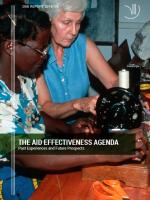The lost momentum of Aid Effectiveness
The 2005 Paris Declaration on Aid Effectiveness provided an important framework for encouraging donor and partner countries to adapt aid management practices to make development cooperation more effective. The agenda it advanced has since lost visibility, even among aid providers that were once its strongest advocates.
This DIIS report, written by Senior Researcher Erik Lundsgaarde and Senior Researcher Lars Engberg-Pedersen, indicates that there are several explanations for the declining attention to Paris Declaration principles. Implementation of the agenda was challenging from the outset due to different starting points among countries, the tension between a universal approach and the need to adapt cooperation approaches to varied contexts, and the tradeoffs involved in implementing prescriptions such as increasing partner ownership, strengthening donor coordination, and improving results management.
In spite of these challenges, the authors argue that core ideas from the Paris Declaration remain valid today. In particular, the importance of fostering partner ownership and measuring results has not faded. Improving the consistency of how donors pursue these objectives in practice is essential in carrying lessons from decades of development cooperation experience forward.
This DIIS Report has received financial support from the Ministry of Foreign Affairs of Denmark. It reflects the views of the authors alone.
DIIS Experts


